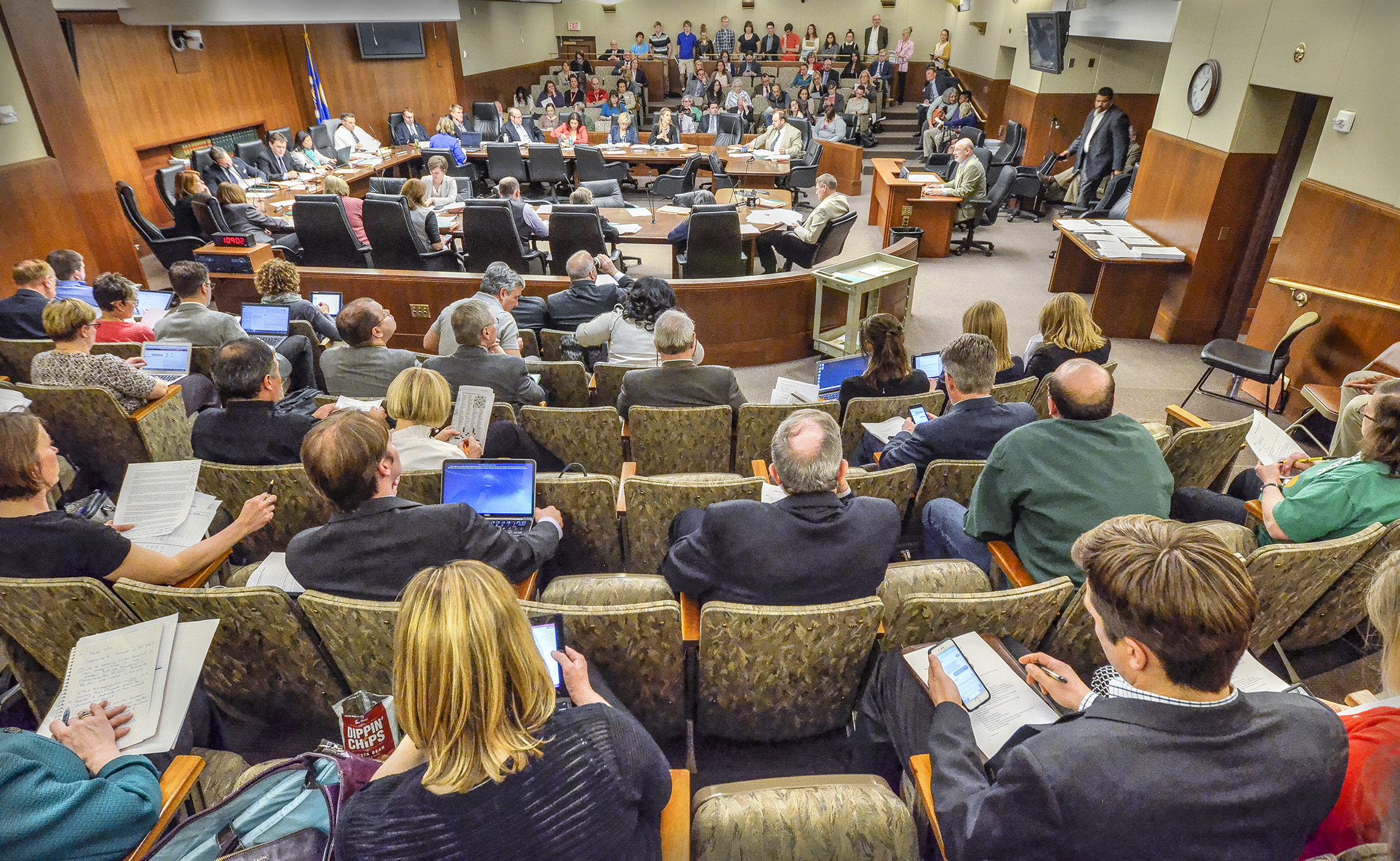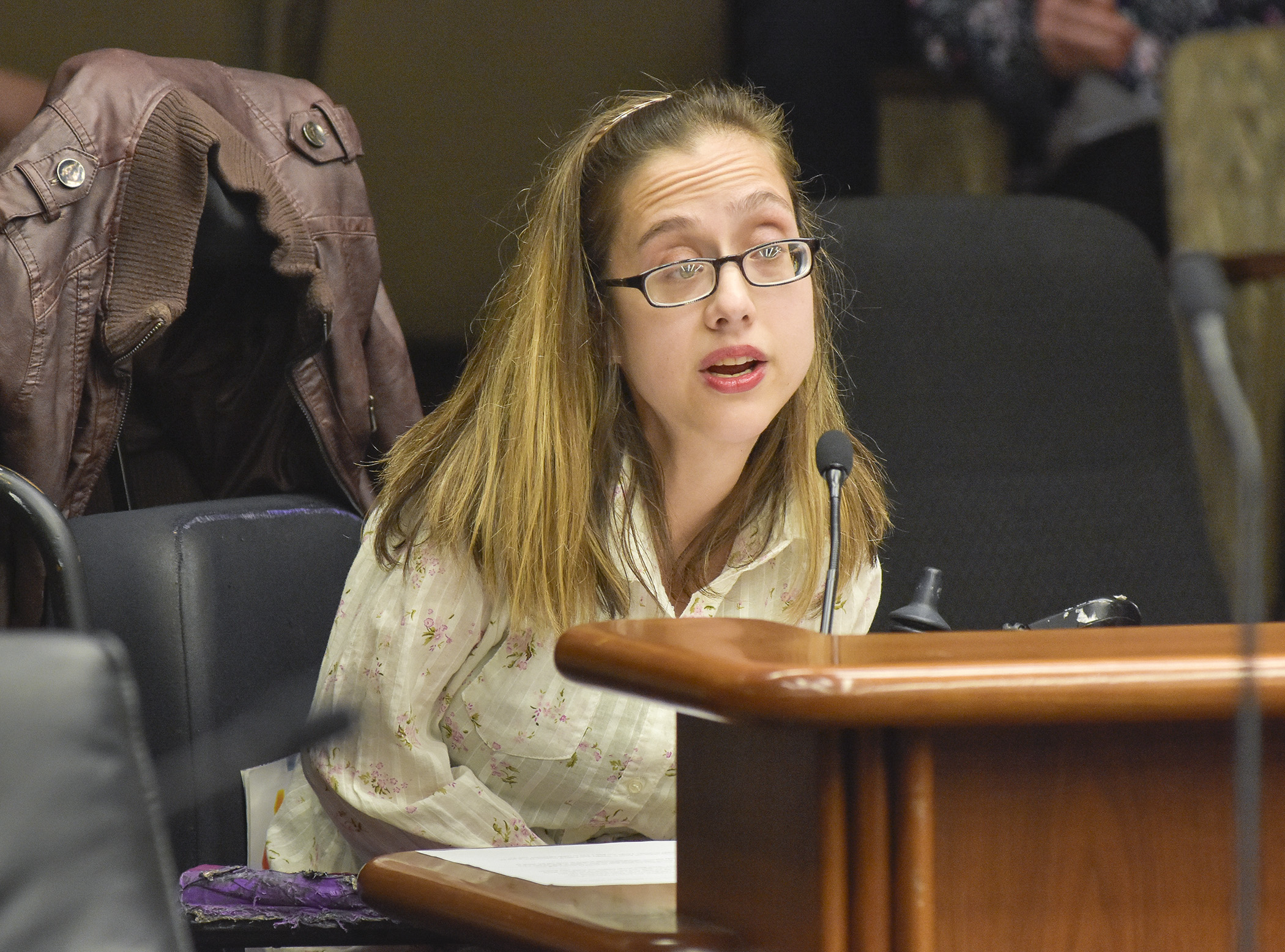Omnibus HHS finance bill would keep funding flat, repeal MNsure

Despite no new money in the House’s supplemental funding budget, the House Health and Human Services Finance Committee found a way to add new spending – largely by putting an end to MNsure.
The omnibus health and human services finance bill, as amended with a delete-all and other amendments, calls for more than $13.3 million in new spending for Fiscal Year 2017 and over $27.2 million in the 2018-19 biennium. The new spending would be offset by shifting several funds, particularly from MNsure.
Sponsored by Rep. Matt Dean (R-Dellwood), the committee chair, HF3467 was approved on a split-voice vote by the committee Friday. It was referred to the House Ways and Means Committee.
In contrast, Gov. Mark Dayton’s supplemental budget calls for increasing health and human services appropriations by $199 million for Fiscal Year 2017 and $656 million in the 2018-19 biennium.
The Senate budget target released Wednesday seeks $43.3 million in new health and human services spending.
Spending
The bill would incorporate language from 45 bills, including a large portion of the nearly 50 bills the committee heard this session. The provisions would tackle a wide range of issues, but the majority require under $250,000 in funding or contain language-only changes.
Sponsored by Rep. Dave Baker (R-Willmar), HF3026 would reduce a counties’ share of chemical dependency treatment costs from nearly 23 percent to 15 percent. A onetime $3.79 million appropriation in Fiscal Year 2017 would cover associated costs.
Coming from HF3615, sponsored by Rep. Jason Rarick (R-Pine City), the omnibus bill would spend $2.2 million in Fiscal Year 2017 and $4.7 million in Fiscal Years 2018 and 2019 to refund or prevent collection of liens brought against certain Minnesotans over age 55 who gained eligibility for Medical Assistance under the federal Affordable Care Act. Federal law requires states to make claims for the cost of benefits against the estates of these select individuals; state law requires recovering the liens after the individual and their spouse die.
A network of community behavioral health clinics to help individuals with complex mental and chemical health conditions would be created with an $188,000 appropriation in Fiscal Year 2017. The spending would jump to $8.4 million in the next biennium. This is based off HF2609, sponsored by Rep. Debra Kiel (R-Crookston).
Other spending would include:
- $1 million Fiscal Year 2017 and $2 million in the 2018-19 biennium for grants to help fund new or existing family medicine residency positions in residency programs outside of the seven-county Twin Cities metropolitan area;
- $1 million Fiscal Year 2017 and $2 million in the 2018-19 biennium to implement several proposals for addressing child care needs determined by the Select Committee on Affordable Child Care, which was established last January; and
- $975,000 in Fiscal Year 2017 and $1.6 million in the 2018-19 biennium for grants to recovery community organizations, which are nonprofits run by representatives of long-term addiction recovery individuals and their families.
The bill would fund its new spending almost exclusively by reducing MNsure information technology and operational appropriations from the General Fund.
Another $423,000 in Fiscal Year 2017 and $426,000 in Fiscal Year 2018 would come from money allocated the Department of Commerce to obtain a federal waiver to allow individuals to purchase health plans outside of MNsure and still qualify for premium tax credits. The department would pursue the waiver without the funds. Another $2 million would be taken from the Consolidated Chemical Dependency Treatment Fund’s administrative fund. That number is the amount collected in excess of the planned administrative needs due to a quirk of the funding mechanism.
MNsure
A repeal of MNsure, the state’s health insurance marketplace, is in the bill, provided the state can secure a federal waiver and begin transitioning Minnesota health care shoppers to the federal Healthcare.gov website starting with 2017 enrollments.
Rep. Nick Zerwas (R-Elk River) heavily criticized the program, arguing it had categorically failed or unperformed in all of its objectives. Dean said persisting problems, ranging from people struggling with sign up due to a faulty website when the program launched to more recent paperwork glitches, demonstrated the lack of functionality within the program despite nearly $300 million spent on it.
Zerwas particularly emphasized his criticism of MNsure when he successfully amended the bill to halve MNsure’s tax on the value of premiums for private policies to 1.75 percent starting Jan. 1, 2017.
The amendment would allow MNsure to “buyback the withholding,” if it consistently met several benchmarks for improvement in subsequent years, including implementing automatic processing of enrollment renewals for qualified health plans and public health care.
“There is no reason Minnesotans should be paying full price for a program that has failed every benchmark … in every measurable way,” Zerwas said.
Rep. Tina Liebling (DFL-Rochester) said MNsure still faces problems, but it is ridiculous to say nothing has worked, noting many Minnesotans have benefitted from the program. She opposed the Zerwas amendment, stating she was concerned it could result in health care information errors and fraud risks.
 Nikki Villavicencio, representing SEIU Healthcare Minnesota, speaks to the House Health and Human Services Finance Committee April 14 during public testimony on an amendment to the committee’s omnibus bill. Photo by Andrew VonBank
Nikki Villavicencio, representing SEIU Healthcare Minnesota, speaks to the House Health and Human Services Finance Committee April 14 during public testimony on an amendment to the committee’s omnibus bill. Photo by Andrew VonBank“We don’t have a system based on trust. It’s based on proving things (with documents) so that when the numbers come out, they are accurate,” Liebling said.
“The idea that MNsure is operational is really, really astounding to me … Over $300 million spent and the system still doesn’t work,” Zerwas responded.
Language from HF2625, sponsored by Zerwas, would remove the human services commissioner from the MNsure board and replace the spot with “a member representing the interests of the general public.”
No state security hospital spending
Several staff members from the Minnesota Security Hospital in St. Peter criticized the committee Thursday for not including spending items present in Dayton’s budget that would fund staffing to improve safety and patient care – including $24.5 million in Fiscal Year 2017 and $35.6 million in Fiscal Year 2018 for the St. Peter campus.
Amy Long, medical services administrator with the Department of Human Services, said security hospital staff is dedicated to serving patients with complex mental health needs, but budget shortfalls make it difficult.
“It’s very discouraging to see dedicated staff members burn out because they have to do the work of two or three people (due to staff shortages),” Long said.
Tim Headlee, a security counselor and president of AFSCME Local 404 at the St. Peter facility, said limited staff increases the risk of patients injuring staff members.
“Even today, we have people getting stabbed in the face … (injured) in the arm, the elbow,” he said. “We rely on your support. I’m hoping to not have to return with stories of higher injury numbers.”
Scott Melby, the security and program manager at the hospital, said at least 50 staff members could be cut in the future if additional funding isn’t secured.
What’s in the bill?
The following are select bills that have been incorporated in part or in whole into the omnibus health and human services finance bill:
Related Articles
Search Session Daily
Advanced Search OptionsPriority Dailies
Ways and Means Committee OKs proposed $512 million supplemental budget on party-line vote
By Mike Cook Meeting more needs or fiscal irresponsibility is one way to sum up the differences among the two parties on a supplemental spending package a year after a $72 billion state budg...
Meeting more needs or fiscal irresponsibility is one way to sum up the differences among the two parties on a supplemental spending package a year after a $72 billion state budg...
Minnesota’s projected budget surplus balloons to $3.7 billion, but fiscal pressure still looms
By Rob Hubbard Just as Minnesota has experienced a warmer winter than usual, so has the state’s budget outlook warmed over the past few months.
On Thursday, Minnesota Management and Budget...
Just as Minnesota has experienced a warmer winter than usual, so has the state’s budget outlook warmed over the past few months.
On Thursday, Minnesota Management and Budget...